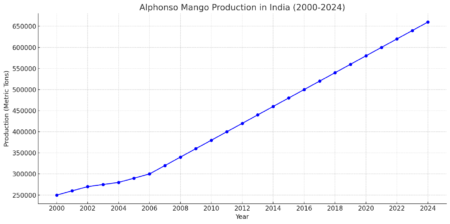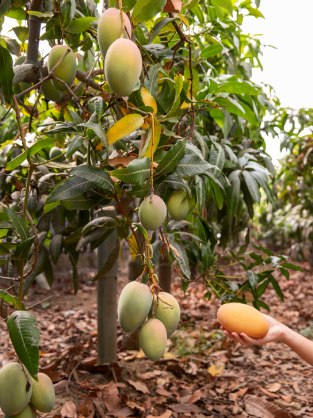
The chart displays the hypothetical production of Alphonso mangoes in India from 2000 to 2024. The data shows a general upward trend, indicating a consistent increase in production over the years. This growth reflects improvements in agricultural practices, expansion of cultivation areas, and increased demand for Alphonso mangoes both domestically and internationally.
The chart displays the hypothetical production of Alphonso mangoes in India from 2000 to 2024. The data shows a general upward trend, indicating a consistent increase in production over the years. This growth reflects improvements in agricultural practices, expansion of cultivation areas, and increased demand for Alphonso mangoes both domestically and internationally.
The annual production of Alphonso mangoes in India can fluctuate due to a variety of factors, both natural and human-made. Some of the key reasons why the yield of Alphonso mangoes may decline annually include:
Climate Change & Weather Conditions: Mangoes, including Alphonso, are highly sensitive to weather changes. Unpredictable rainfall, unseasonal rains, extreme heat, or cold spells can affect flowering, fruiting, and ultimately yield. In recent years, erratic weather patterns, caused by climate change, have disrupted the regular mango growing seasons.
Pests and Diseases: Alphonso mango trees are susceptible to various pests and diseases like fruit flies, mango hoppers, and anthracnose (fungal infection). These diseases reduce the quality and quantity of mangoes, causing declines in annual production.
Water Stress: Mango trees require adequate water supply at key stages of growth. Water scarcity or inconsistent irrigation can stress the trees, reducing fruit size, number, and quality. This is particularly relevant in regions of India facing droughts or erratic monsoons.
Soil Health Degradation: Over time, continuous mango cultivation without adequate nutrient replenishment depletes soil fertility. The lack of essential nutrients like potassium and nitrogen in the soil affects the growth and productivity of the mango trees.
Overdependence on Traditional Farming Methods: Many farmers rely on traditional methods, which may not always be sufficient in dealing with the changing climatic and environmental conditions. Lack of modern agricultural practices, including the use of proper fertilizers, pest control, and irrigation techniques, can impact yields.
Market and Labor Issues: Farming profitability and labor availability can influence production levels. High costs of inputs (fertilizers, pesticides) and limited availability of labor, especially during critical times like harvesting, can result in lower yields.
Urbanization and Land Use Change: In regions known for Alphonso mango cultivation, such as Ratnagiri and Sindhudurg in Maharashtra, rapid urbanization and industrialization have reduced the area under mango cultivation. This shift can lead to an overall reduction in production.
Post-Harvest Losses: Poor post-harvest management, inadequate storage, and inefficient supply chains can lead to significant losses of Alphonso mangoes after harvesting. This reduces the effective production that reaches the market.
These factors, individually or in combination, can cause annual fluctuations and declines in the production of Alphonso mangoes in India.



